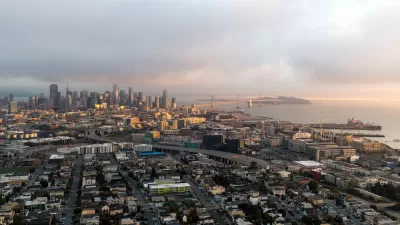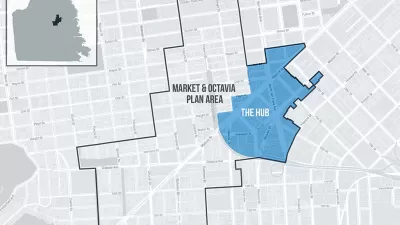An incredibly complex development proposal for 20 acres of Caltrain railyard is back on the table, nearly a decade since it first made news in San Francisco.

A proposal that would redevelop the Caltrain yard in San Francisco into a massive redevelopment project—which has been making the Planetizen newswire since 2013—has new life.
According to a paywalled article by J.K. Dineen for the San Francisco Chronicle, the Caltrain yard is one of the Bay Area's most complicated sites—20 acres of railyard straddling the space between the neighborhoods of South of Market (SoMa) and Mission Bay. One of the key challenges to the project would be moving the railyards underground.
So after four years of quiet, what does the new interest in the project look like? Dineen reports:
This week Caltrain and developer Prologis, which owns the 20-acre site, are working jointly with architects and engineers and other public agencies to complete a “business case study” that will lay out solutions for both the future of rail in San Francisco and potential development — likely a lot of housing — on whatever land is freed up by the reconfiguration of the station at Fourth and King streets and the rail yards that stretch four blocks.
A virtual public meeting was held earlier this month, and already the conversation around the project is taking a different tone in a city famous for development controversy:
The potential redevelopment of the rail yards is different from other big public-private megaprojects because the conversation will not be driven by the normal San Francisco fights around affordable housing or building heights or open space. It will be shaped by the question of what best serves the future of Caltrain and high-speed rail.
San Francisco is one of the cities in California facing the prospect of losing local control of zoning regulation after running afoul of state law and not planning adequately for new housing—a group that includes Redondo Beach in Southern California and Palo Alto and Cupertino in the Bay Area.
While the 20-acre site is capable of providing thousands of housing unit, according to Leigh Lutenski, a deputy director at the San Francisco Office of Economic and Workforce Development, the project's backers are "thinking in broad strokes about land uses and densities" at this point in the process.
FULL STORY: A big S.F. rail yard project has goals of transforming transit. Could it also bring more housing? [paywall]

Planetizen Federal Action Tracker
A weekly monitor of how Trump’s orders and actions are impacting planners and planning in America.

Maui's Vacation Rental Debate Turns Ugly
Verbal attacks, misinformation campaigns and fistfights plague a high-stakes debate to convert thousands of vacation rentals into long-term housing.

San Francisco Suspends Traffic Calming Amidst Record Deaths
Citing “a challenging fiscal landscape,” the city will cease the program on the heels of 42 traffic deaths, including 24 pedestrians.

Amtrak Rolls Out New Orleans to Alabama “Mardi Gras” Train
The new service will operate morning and evening departures between Mobile and New Orleans.

The Subversive Car-Free Guide to Trump's Great American Road Trip
Car-free ways to access Chicagoland’s best tourist attractions.

San Antonio and Austin are Fusing Into one Massive Megaregion
The region spanning the two central Texas cities is growing fast, posing challenges for local infrastructure and water supplies.
Urban Design for Planners 1: Software Tools
This six-course series explores essential urban design concepts using open source software and equips planners with the tools they need to participate fully in the urban design process.
Planning for Universal Design
Learn the tools for implementing Universal Design in planning regulations.
Heyer Gruel & Associates PA
JM Goldson LLC
Custer County Colorado
City of Camden Redevelopment Agency
City of Astoria
Transportation Research & Education Center (TREC) at Portland State University
Jefferson Parish Government
Camden Redevelopment Agency
City of Claremont





























